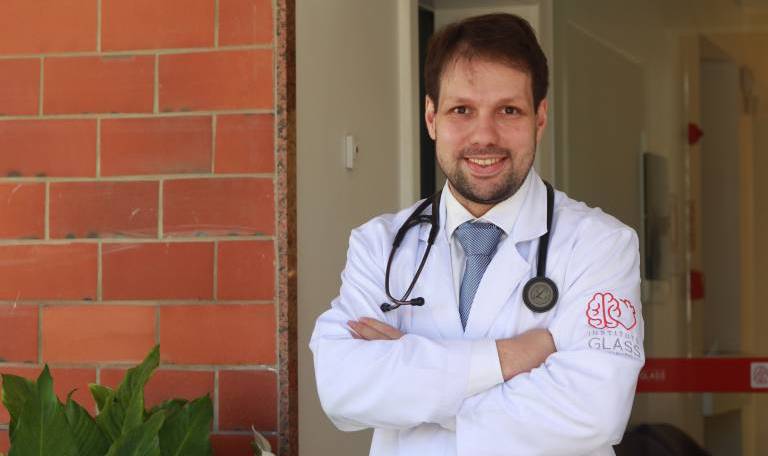Philip George Glass - MSc in Clinical Neurology

Job title: Assistant Professor of Neurology
Employer: Universidade Estadual do Sudoeste da Bahia
Why did you choose to study your programme and what made you choose UCL Faculty of Brain Sciences/Institute?
The Institute of Neurology (IoN) is very famous in the Neurology field and I always dreamed of studying there.
I learned about the MSc course after meeting Professor Andrew Lees in Brazil. I decided to apply for the MSc to improve my knowledge in Neurology and also to prepare myself to study a PhD as well as a fellowship in movement disorders afterwards.
What did you enjoy most about your programme?
I really enjoyed the opportunities to learn directly from the most renowned figures in neurology. Studying in the Institute felt like I was living inside a great Neurology Congress that never ended. I also loved the life in London and meeting many people from all over the world.
Please give details of any study abroad experience and/or industry/work placements you undertook as part of your studies.
During my MSc programme, I worked under professor Andrew Lees, supervision in the Queen Square Brain Bank. The results of my research on Vascular Parkinsonism were published in an important neurological journal.
It was very important that I continued my studies because I wanted to work in academia, so I went on to study a PhD. I am now an assistant professor of neurology.
Since graduating, I have maintained my IoN contacts and I still collaborate with the Institute.
Did you experience any benefits from studying in London? If so, what were they?
London is a very nice city to live. It offers the opportunity to meet people from all over the world. It is also easy to travel, and it is accessible to the rest of Europe.
During my time in London, I was also able to take part in lots of extracurricular activities outside of university which helped me to unwind e.g. local magic lessons and cooking course.
Do you have any tips or helpful advice for incoming students?
Planning in advance is absolutely essential. I started planning almost four years in advance. As I was an overseas student from Brazil, it was necessary to pass the language proficiency test (IELTS) and that required me to take some English lessons. I also needed to work more hours and save money so that I could pay for the fees and living expenses.
When looking for somewhere to live, it is important to find somewhere with accessible public transport links. The university accommodation is cost-effective, but the numbers are limited so it is important to plan in advance.
How did you get to where you are now in your career? Was there anything in particular from your time at UCL Faculty of Brain Sciences/Institue that was valuable?
fter completing an MSc and PhD, I am now an Assistant Professor of Neurology in Brazil and an Honorary Teaching Neurology Assistant in the Distance Learning programme at UCL Queen Square Institute of Neurology.
I also own a private clinic where I work with other neurologists and different medical professionals.
How have you applied the learning from your degree in your job?
On a daily basis, I am able to apply the things that I have learnt from my degree into my professional role - I always refer back to the material from the course.
The MSc is also very practical, and I learnt most of my neurological skills from the National Hospital for Neurology and Neurosurgery (NHNN).
What do you enjoy most about your job if applicable?
I am currently an Honorary Teaching Assistant for the Clinical Neurology via Distance Learning programme of UCL. I really enjoy this job as it offers me the opportunity to continuously learn from the lectures and the discussions in the forums.
Is there anything else you would like to say about your time at UCL Faculty of Brain Sciences?
I very strongly recommend the MSc Clinical Neurology to any neurologist or anyone interested in following the Neurological career. It offers the possibility to learn directly from the most renowned specialists in the field. The NHNN treat the most complex patients so by studying at the IoN, I was also able to see these patients – something I would never have been able to see if I had not studied there.
 Close
Close

